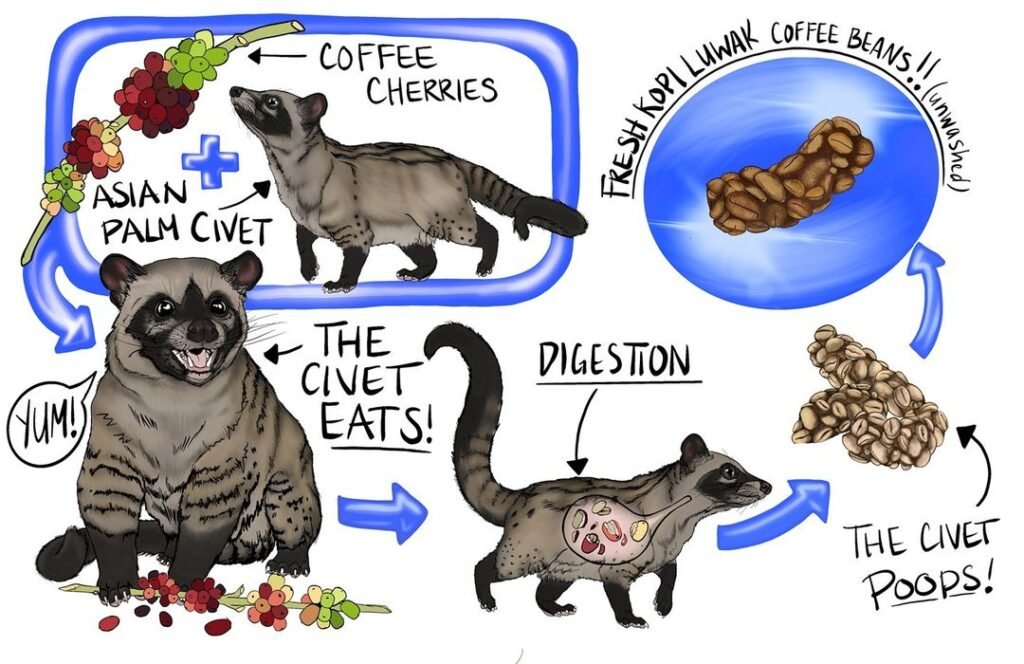Bali’s Kopi Luwak Coffee-One stop shop
Bali’s kopi Luwak is your gateway to the world of exotic coffee experiences, specializing in the rarest and most sought-after coffee variety – Kopi Luwak. Our website is dedicated to providing you with an immersive journey into the realm of this extraordinary coffee, its history, production process, health benefits, and more.
What is Kopi Luwak?
Kopi Luwak, also known as civet coffee, is one of the rarest and most expensive types of coffee in the world. It is produced from coffee beans that have been digested and excreted by the Asian palm civet, a small mammal native to Indonesia. The unique fermentation process that occurs in the civet’s digestive system gives Kopi Luwak its distinct flavor profile, which is both rich and smooth.
History of Kopi Luwak
The history of Kopi Luwak dates back to the 18th century, when Dutch colonizers in Indonesia discovered the unique coffee production process. Initially, Kopi Luwak was considered a delicacy among the indigenous people of Indonesia and was later introduced to the global market. Today, Kopi Luwak is highly prized among coffee connoisseurs and is considered a luxury item.
Processing of Producing Kopi Luwak Coffee by Wild Asian Palm Civet
Producing kopi luwak coffee involves several unique steps:
-
Civet Selection: The process begins with the selection of the civet, a small mammal known for eating coffee cherries.
-
Feeding: The civet consumes ripe coffee cherries, selecting only the best ones. The cherries pass through its digestive system, where enzymes break down some of the fruit’s pulp.
-
Digestion: During digestion, the beans are fermented, which enhances their flavor profile. The beans are then excreted, whole and undigested.
-
Collection: The beans are collected from the civet’s feces. This is often done in the wild or from civet farms, depending on the production method.
-
Cleaning: The collected beans are thoroughly washed to remove any impurities and residues.
-
Drying: After cleaning, the beans are dried under the sun to reduce moisture content, which is essential for proper storage and flavor development.
-
Roasting: The dried beans are roasted to bring out their flavor. The roasting process varies depending on the desired flavor profile.
-
Grinding and Brewing: Finally, the roasted beans are ground and brewed, resulting in the unique kopi luwak coffee known for its smooth, rich flavor.
Due to ethical concerns about civet farming practices, many coffee enthusiasts recommend sourcing kopi luwak from reputable producers who prioritize animal welfare.

Ethical and Environmental Concerns
- Animal Welfare: The growing demand for kopi luwak has led to the establishment of civet farms, where the animals are often kept in poor conditions. Ethical concerns arise from the treatment of civets in these facilities.
- Wild vs. Farmed: Wild-sourced kopi luwak is considered more ethical but is rarer and more expensive. It’s important to ensure the kopi luwak you purchase is sustainably and ethically sourced.
- Environmental Impact: The production of kopi luwak can have various environmental impacts, especially if it involves deforestation or other harmful practices.
Cost
Due to its labor-intensive production process and the limited supply, kopi luwak is one of the most expensive coffees in the world. Prices can range significantly, often reaching hundreds of dollars per kilogram.
Alternatives
For those interested in the unique taste profile of kopi luwak but concerned about ethical issues, some producers are exploring synthetic fermentation processes that mimic the digestive process of the civet without involving animals.
FAQS
How is Kopi Luwak coffee made?
Kopi luwak, in its simplest form, refers to coffee beans that have undergone fermentation through the digestive system of a Civet cat. This natural process takes place during the annual coffee harvest, as the luwaks freely wander coffee plantations during the night, carefully
choosing the ripest coffee cherries to consume. It is the meticulous selection and fermentation process that ultimately yields a rare and exquisite coffee indulgence.
What is Kopi Luwak coffee made of?
Kopi luwak comprises 100% coffee beans, but it is crucial to understand that there are various qualities of Kopi luwak beans, leading to distinct cup experiences. For an exceptional taste, certain factors must be considered. Firstly, the Luwak must selectively choose the coffee
cherries for ingestion. Secondly, since the fermentation occurs within the Luwak’s digestive system, it is vital that the animal is found in the wild.
Therefore, Difference Coffee categorizes all caged Kopi Luwak as counterfeit and refrains from sourcing such beans. Lastly, for genuine deliciousness, the coffee beans must undergo meticulous hand sorting to eliminate any defects.
Whats the difference between black ivory coffee and Kopi luwak coffee?
Kopi luwak and Black Ivory coffee share a similarity in that both involve the consumption of coffee cherries by an animal and subsequent fermentation within their digestive system. However, the key
distinction lies in the natural occurrence of Kopi luwak. Wild Civet cats naturally consume coffee cherries during the coffee harvest, whereas elephants typically do not. Consequently, we focus on natural practices and refrain from involving any processes that deviate from the animal’s natural behavior.